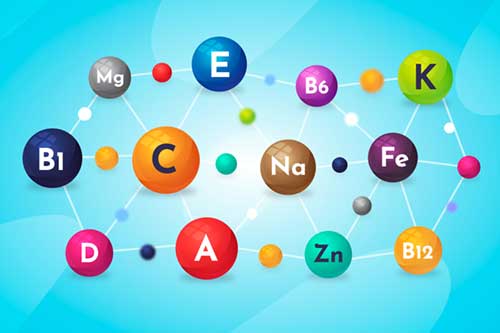If we are to focus on a comprehensive approach to improve women’s health, then we cannot ignore the following – an awareness of factors that affect women’s health, a nutritious and balanced diet and appropriate lifestyle modifications. Leading a sedentary lifestyle, genetic influences and reduced intake of micronutrients also play a crucial role.

Women Population Should Always Focus on the 4 Es
E – Eat right
E – Eliminate stress
E – Exercise daily
E – Educate on own health
From a Nutritionist’s Perspective, the 3 Ds Are Important – Diversified Diet Without Delay
Micronutrients play a central part in metabolism and in the maintenance of body functions. Micronutrients are an important group of nutrients that are needed for a healthy body. They include vitamins, minerals and trace elements. They act as catalysts in all the physiological reactions taking place in our body. Vitamins play crucial roles in energy production, blood clotting, immunity building, etc. Minerals and trace elements are responsible for growth, healthy bones, etc.
Decrease in micronutrients adversely affects the body’s immunity and makes the body prone to infection. Micronutrients have a great impact in every stage of women’s health. Diet quality for women is important for their health in the present and the future. Studies show that across the world, women do not get the micronutrients they need. Women’s micronutrient status affects not only their own health but also the next generation’s. Some of the micronutrient dense food items best suited for women are discussed below.
Simple Ways to Fuel up on Micronutrients – The Powerhouses of the Body
Sprouts:
They are baskets of multivitamins rich in vitamin C, A & B complex. During the sprouting process, the nutritional profile of the seeds undergoes significant changes, which make them dense in micronutrients and also easy to digest and low in calorific value – a 100 g serving just giving approximately less than 40 kcal. They are excellent sources of fibre, calcium, magnesium, iron and potassium. They also improve gut health as they contain fibre which serves as a prebiotic which nourishes the probiotic which in turn favours the growth of beneficial bacteria.
Note:
Rinse sprouts thoroughly under running water before consumption. They are best when purchased and consumed fresh.
Green Leafy Vegetables & Micronutrients: Green leafy vegetables are rich sources of nutrients like vitamin K, magnesium, and potassium. They also carry plenty of phytochemicals such as B-carotene and flavonoids. They contain a good amount of polyphenols and antioxidants which are known for their unique therapeutic values.
Benefits of Getting More Greens:
- Very high in vitamins C & K which help strengthen the immune system.
- Contain more calcium per calories.
- Great source of magnesium for muscle and nerve functions.
- Contain anti-inflammatory nutrients.
- Rich in fibre which helps cleanse the digestive tract.
Fruits & Micronutrients:
Fruits are excellent sources of essential vitamins and minerals and they are also high in fibre. They provide antioxidants.
Essential Food Sources of Calcium Which Are Much Needed
- 130 grams of paneer gives 185 mg of calcium.
- 170 grams of plain yoghurt gives 181 mg of calcium.
- 150 grams of green peas gives 98 mg of calcium.
- 250 ml of low-fat milk gives 310 mg of calcium.
- 50 grams of green leafy vegetables gives 85 mg of calcium.
- 30 grams of cheese gives 202 mg of calcium.
Micronutrients – Requirement for Women
| NUTRIENTS | WOMEN | PREGNANT | LACTATION | |
|---|---|---|---|---|
| Vitamin A (UG) | 840 | 900 | 950 | 950 |
| Thiamine B1 (mg) | 1.4 | 2.0 | 2.1 | 2.1 |
| Riboflavin B2 (mg) | 1.9 | 2.7 | 3.0 | 2.9 |
| Niacin (mg) | 11 | 13 | 16 | 16 |
| Vitamin C (mg) | 65 | 80 | 115 | 115 |
| Vitamin B6 (mg) | 1.9 | 2.3 | 2.16 | 2.07 |
| Folate (ug) | 200 | 570 | 330 | 330 |
| Vitamin B12 (mg) | 2.2 | 2.45 | 3.2 | 3.2 |
| Vitamin D (IU) | 800 | 600 | 600 | 600 |
| Calcium (mg) | 1200 | 1000 | 1200 | 1200 |
| Magnesium (mg) | 370 | 440 | 400 | 400 |
| Iron (mg) | 19 | 27 | 23 | 23 |
| Zinc (mg) | 13.2 | 14.5 | 14.1 | 14.1 |
| Iodine (ug) | 140 | 220 | 280 | 280 |
Dishes Which Are Rich in Micronutrients Which Can Be Included in Diet Periodically

- Sprouts dosai & idly
- Sprouts raita
- Urad dhal laddoo with dry fruits
- Dates laddoo
- Red banana milk shake
- Red rice flakes with grated coconut and fruits
- Drum stick leaves and dhal powder
- Moong dhal and agathi keerai dosai
- Lotus stem makkana
Note – Try to include such food items daily in your diet. Daily one or two servings of any one of this along with your routine balanced diet will meet your micronutrient requirements.

Ms. Yamini Prakash
Lead Clinical Dietitian
Kauvery Hospital Chennai

